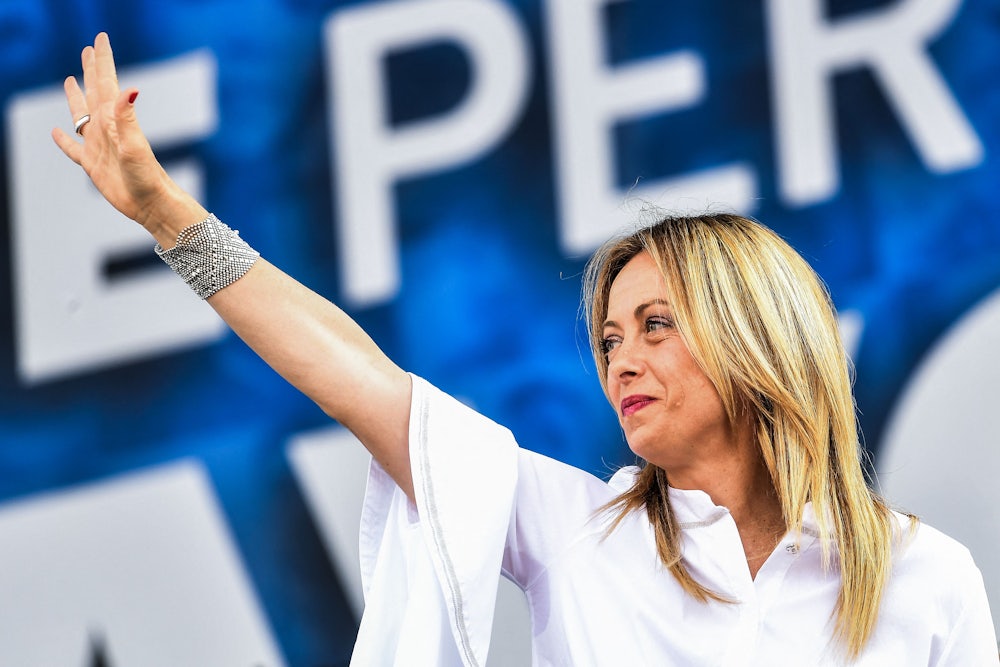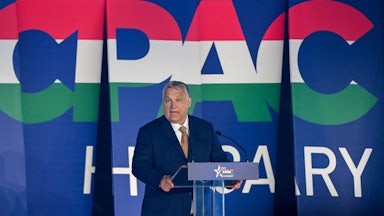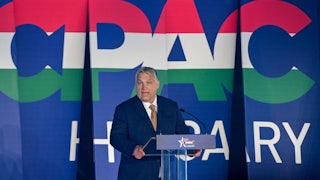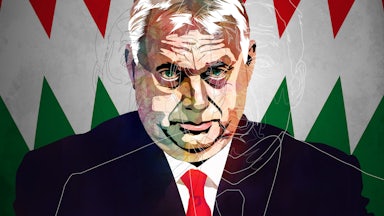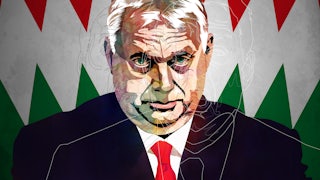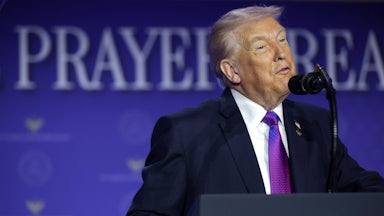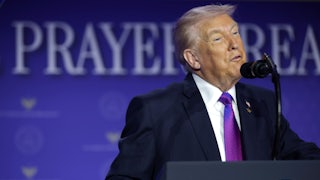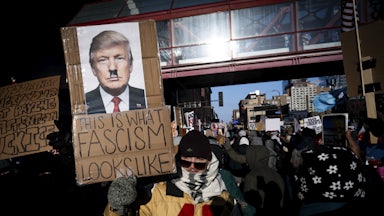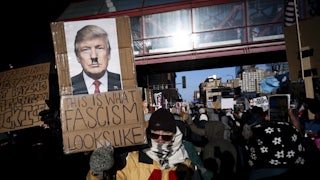The coverage of Italy’s recent elections in the American press has portrayed the success of Giorgia Meloni’s Brothers of Italy party as a sudden and dangerous recrudescence of Italy’s fascist past. “The Return of Fascism,” declared The Atlantic. “A far-right group with neo-fascist roots wins big in Italy’s election,” ran the headline of a National Public Radio story. A New York Times story about Meloni used the words “fascism” or “fascist” 28 times.
While not strictly speaking inaccurate, the fascist storyline obscures much more than it reveals and offers a simplistic picture of the complex circumstances that account for Meloni’s victory.
Yes, it’s true that Meloni was a youthful member of the Movimento Sociale Italiano (Italian Social Movement), or MSI, a party that was formed out of the ashes of Mussolini’s fascist party after World War II, even though it refrained from calling for a return to fascism and polled consistently in the single digits. In 1994, when the MSI seemed on the verge of extinction, garnering just 5.7 percent of the vote, the party changed its name, becoming Alleanza Nazionale (National Alliance) in 1994, and made a point of distancing itself from its fascist roots, causing most of its dyed-in-the-wool neofascists to form their own tiny splinter party. Meloni chose to remain with the reformed National Alliance. Its leader, Gianfranco Fini, who had once called Mussolini the greatest statesman of the twentieth century, traveled to Israel and declared, while visiting Yad Vashem, that “fascism was part of absolute evil” and that there “was no excuse for [Mussolini’s] infamous racial laws.”
The new, more moderate course pursued by Fini paid off, nearly tripling his party’s vote, making National Alliance Italy’s third-largest party in 1994 and the second-largest party in Berlusconi’s four different governments. Current foreign coverage of Meloni and her party creates the impression of her as the heir of Mussolini, born, like Athena, from the head of Zeus, rather than the product of a much longer genealogy, three generations removed from fascism, that she actually is.
The three parties that will make up Meloni’s coalition government—Brothers of Italy, Berlusconi’s Forza Italia, and the Lega (formerly the Northern League)—are essentially the same parties that made up various Berlusconi governments from 1994 until 2011. The differences are that what was once called National Alliance dissolved and some of its members, including Meloni, formed Brothers of Italy in 2014. And while National Alliance was the second-strongest party in the various Berlusconi governments, Brothers of Italy is now the country’s largest party with 26 percent. The Lega and Forza Italia have shrunk to about 8 percent each.
If Meloni’s party succeeded in moving from only 4 percent of the vote in 2018 to over 26 percent, it was not by offering a return to fascism. Quite the contrary: Meloni won consensus in 2022 by tacking hard to the center, presenting a picture of reassuring moderation, and abandoning previous suggestions that Italy drop out of the eurozone. She reaffirmed Italy’s adherence to NATO, harshly criticized Vladimir Putin, and supported military aid to Ukraine. She also went out of her way to distance her party from the fascist past. “There is no fascist nostalgia, racism, or antisemitism in the DNA of Brothers of Italy,” she told the centrist newspaper Corriere della Sera earlier this year. “We are very far from fascism. The Italian right has consigned fascism to the history books decades ago, and condemns without ambiguity the suppression of democracy and the shameful racial laws.”
Some people wonder whether her campaign rhetoric is merely a superficial facade that hides fascist tendencies among some of her party’s leadership. That is possible, of course, but Meloni is a shrewd politician competing in an electoral marketplace with very little demand for fascism.
It is more useful to put aside the fascist frame and see Brothers of Italy in a growing line of populist, anti-establishment movements that has risen and fallen in Italy during the past 30 years.
Meloni makes at least the sixth populist hero to have strutted across the Italian political stage in the past 29 years. Berlusconi took his Forza Italia from nothing to Italy’s largest party (with 21 percent of the vote) in 1994, presenting himself as the quintessential anti-politician, the billionaire businessman who was going to shake up the Italian system and apply his entrepreneurial skills to the country as a whole. For a time, Berlusconi’s most formidable rival appeared to be Antonio Di Pietro, the former prosecutor and charismatic leader of Milan’s anti-corruption investigation known as Operation Clean Hands. He too was a nonpolitician promising to clean house and, for a time, was Italy’s most popular public figure. He formed his own political party but failed to build a coherent political movement, and it faded after several years.
When Berlusconi failed to deliver his economic miracle, other populist challengers emerged. In the early 2000s, the comedian Beppe Grillo began building a political movement that eventually became the Five Star Movement, which included mass rallies in which he yelled “Up yours!” to Italy’s political establishment. Matteo Renzi, the former mayor of Florence, briefly offered a populist alternative to the center-left. Taking over the Democratic Party, Italy’s main center-left party, Renzi promised to send the established leaders of his own party to the “demolition dump” and proposed a root and branch reform of Italy’s sclerotic political system.
That won Renzi more than 40 percent of the popular vote in 2014, an exceptionally high percentage given Italy’s proportional multiparty electoral system. But that didn’t last after he foolishly tied his political future to an ill-fated and poorly conceived national referendum that included many highly technical institutional reforms of dubious utility (e.g., getting rid of the National Counsel of Work Economy), which failed in 2016. This made way for the Five Star Movement, which represented a weird blend of left and right populism—pro-worker and abortion rights but anti-immigrant. Next it was the turn of Matteo Salvini, who took over the Northern League—a movement of Northern Italian regional autonomy—in 2013 and turned it almost overnight into a nationalist party, called simply La Lega, in 2018.
If there is an Italian politician who most resembles the aggressive Trumpian right, it is Salvini. As minister of the interior between 2018 and 2019, Salvini grabbed headlines by aggressively blocking shiploads of migrants fleeing Africa from docking in Italian ports. For a time, polls showed his party climbing in popularity above 30 percent, eclipsing his coalition partner, the Five Star Movement.
In a moment of hubris, Salvini decided to bring down his own government, calling for new elections on the assumption that his party would win and he would emerge as prime minister. He had failed to consider the possibility that Five Star, which still had the largest number of seats in parliament, was free to form a new government with the Democratic Party, converting Five Star overnight from a center-right party to center-left one. Five Star’s sudden conversion from right to left shows the volatility of current Italian politics, and its depoliticization—its disconnection from traditional ideological divisions.
What does this history of boom-and-bust populist movements tell us about Meloni’s victory and the 2022 elections? They are all expressions of a convulsive 30-year struggle to attack and renew Italy’s political system, with each failure giving rise to a new populist savior. Italy in the 1970s and 1980s had been one of the world’s fastest-growing economies. By the early 1990s, its gross domestic product had caught up with that of Great Britain, the fifth-largest in the world. But in the era of globalization, with Italy entering the eurozone, many Italians feared that the sins of its political system—high levels of corruption and taxes, powerful organized crime and economic stagnation in Southern Italy, growing public debt, and an inefficient bureaucracy—would reverse those gains unless the system was changed radically.
Since then, Italy’s economic position has gotten much worse. The economy stagnated, becoming one of the most sluggish in the world, actually shrinking in size during the last 10 years. It is now one-third smaller than the U.K.’s. Its public debt is now more than 150 percent of its GDP. The country’s labor laws are good for older workers with permanent positions but bad for young people, who are often forced to work on temporary contracts that net them about 1,000 euros (just under $1,000) a month, hardly enough to support themselves. A shocking number of Italian youths live with their parents into their thirties or have left the country to seek opportunity elsewhere. Some 800,000 young Italians—often the best educated and most ambitious—are estimated to have left the country over the last decade, a tragic brain drain. Those who remain see little future for themselves, reflected in Italy’s incredibly low fertility rate—1.24 births per woman.
Meloni appealed to voters with a rather generic call for “God, Fatherland, and Family,” but it is not clear how this will translate into policy. Aware of Italy’s demographic decline, item number one on the Brothers of Italy’s 25-point platform is help for Italy’s families, encouraging Italian women to have more children by lowering taxes for families with children and providing economic support during the first two years of a child’s life and more daycare as they grow older. This pro-family stance goes hand in hand with the party’s anti-immigrant stance, shared by most other Italian parties.
But Meloni’s predecessors on the right, National Alliance and the Lega, passed a similar law in 2002, promising immediate expulsion for illegal immigrants and an end to human trafficking. Since then, Italy’s immigrant population has nearly tripled to about six million, or roughly 10 percent of the population. Immigrants from the Philippines, Africa, Albania, and the Middle East look after Italy’s elderly, clean their houses, staff factories and construction sites in Northern Italy, pick tomatoes and grapes in the South, work as waiters and cashiers, and run most of the 24-hour fruit and vegetable stands.
The reason for the increase is simple: Deaths in Italy outnumber births by more than 300,000 per year, meaning that if Italy does not bring in a certain number of immigrants per year, its labor force—and the pool of workers to pay the pensions of Italy’s aging population—will shrink dramatically. Italy’s right may like to pretend that the country can do without immigration, but simple arithmetic makes it clear that it cannot. Meloni would like to change this by encouraging Italian families to have more children, but the richest country in Europe, Germany, has a fertility rate of 1.6 children per female, well under the replacement rate. Knowing this, Angela Merkel welcomed a million Syrian refugees, not only as a humanitarian gesture but because she knew that Syria’s generally well-educated citizens would be needed by the German economy.
By refusing to manage immigration rationally—identifying its needs and bringing in workers to fill those needs—Italy has ended up with chaotic and unregulated and often illegal immigration. The right has rejected the idea of jus soli (birth citizenship) or giving citizenship to the children of immigrants born in Italy. And Italian law makes it unnecessarily difficult for young immigrants who have grown up and done their schooling in Italy to become citizens. This too would be a way of replenishing Italy’s workforce with immigrants who are fully assimilated into Italian life—a positive policy that could actually promote growth in Italy’s stagnant economy.
Meloni has gotten applause at rallies by attacking the “LBGTQ lobby,” but in practice the new government is unlikely to change the status of gay rights. Italy already has quite conservative laws regulating gender issues: Italy permits civil unions but does not allow gay marriage, and it also does not allow gay people to adopt children. Much of this has to do with the influence of the Catholic Church at the center of Italian life. Despite this, there is wide support for gay rights, and transgender people have been allowed to change their legal gender since 1982. We are unlikely to see gay marriage legislation under a Meloni government, but I doubt seriously that we will see significant backsliding.
In some ways, the most troubling results of the recent elections were the very poor result of the Democratic Party and the historically low voter turnout of 64 percent. From 1946 until the 1980s, more than 90 percent of Italians generally showed up at the polls. Turnout was still routinely over 80 percent until about 2010, when it went south along with Italy’s economy. With 36 percent of voters staying home in the recent election, the party of abstention is now Italy’s largest party.
The decline of the Democratic Party is also worthy of serious reflection. In theory, the country’s main party of the left should be a vehicle of protest and change. Like many left-leaning parties during the 1990s, the Partito Democratico, or P.D., followed the centrist path of Bill Clinton and Tony Blair. Eager to show that they had shed their Marxist origins, they visited Wall Street and the City (London’s financial district). While the old Italian Communist Party had a lock on the working-class vote, the new P.D. has become, like all Western liberal parties, the party of the educated urban elite. In the years when it came to power—largely because of Berlusconi’s failure—it inherited a genuinely difficult situation: high levels of unemployment, low growth, pressure to cut government waste. It was greatly constrained by both a massive public debt and strict limits set by the European Union on deficits and inflation. Rather than promising a worker’s paradise, it offered to manage the status quo somewhat more competently and somewhat more humanely than the right.
In facing the 2022 elections, the Democratic Party made two big mistakes. It was unable or unwilling to heal its rift with the Five Star Movement, essentially guaranteeing that a united coalition of the right would defeat two left parties running separately. On a deeper level, the P.D. has seemed unable to craft a coherent and passionate message that speaks to the millions of Italians who have fallen behind, feel disenfranchised, and have heard the siren call of populism. It did not challenge Meloni on social issues. Gay marriage and gay rights are quite popular in public opinion polls, and the P.D. could have used gay rights to contrast itself with Meloni. The party had proposed a birth citizenship law when it was in power but didn’t make it a priority, and it failed to pass, even though the center-left had a majority in parliament. Its election campaign seemed vague and half-hearted.
Giorgia Meloni will now have the unenviable task of trying to solve Italy’s deep structural problems where others have failed, and under more difficult circumstances. The cost of electricity—despite government subsidies—went up 131 percent in the first months of 2022, and natural gas prices soared by 94 percent, according to Italy’s energy authority, ARERA. With the war in Ukraine raging and Russia threatening to cut off supplies of gas to Western Europe, things could get much worse, leaving many Italian families with a choice between eating and heating.
The danger for Italy is not, I think, that Meloni will revive fascism but that if she fails to deal effectively with the country’s problems, public disenchantment will become more pronounced, perhaps preparing the way for a new wave of more extreme populism.
